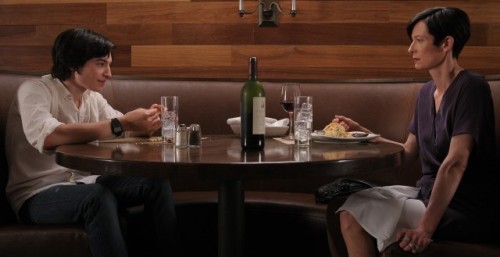When a teenager goes on a violent rampage and kills his fellow students, who is to blame? Someone has to be responsible for such unnecessary, wanton violence. We feel that we can’t blame the kid, because he’s not an adult and is therefore not responsible for his actions. Instead, we blame the parents, usually the mother. In our societal consciousness, the mother is always to blame for her child’s character.
Lynne Ramsay’s new film, We Need to Talk About Kevin (2011), addresses this question of parental responsibility. When we first meet Eva Khatchadourian (a marvelous Tilda Swinton), she is a pariah in her town, shunned by all her neighbors and former friends as the town recovers from her son’s attack on the school. The film jumps back and forth in time as we learn more about Eva and her troubled relationship with her son, Kevin.
From the moment Kevin is born, Eva instantly feels a profound alienation from him. The film portrays our darkest fears about motherhood: what if we don’t love our baby? What if we’re bad parents? What if our child manifests our worst qualities? What if we can’t fix them? All these questions manifest themselves in the film, as both Kevin and Eva distinctly dislike each other. Even as a baby, he cries constantly in her arms and will only quiet when his father (John C. Reilly) holds him.
As Kevin grows up, he becomes openly antagonistic toward his mother. One of the most disturbing aspects of this film (and there are many) is seeing a small child be purposefully cruel. It’s not news that children can be mean and hurtful, but the look in 6-year-old Kevin’s eyes as he says extremely calculated things to his mother is terrifying. As a teenager, this quality only worsens, and Ezra Miller is pitch-perfect as teenage Kevin. His dark, angry gaze seems to pierce through Ms. Swinton’s thin frame, and his line delivery is just chilling. The fact that he looks so much like his mother is, of course, purposeful, and it gives his coldness a doubly eerie effect.
Ms. Ramsay’s mastery of the visuals in this film is remarkable. She knows just how long to linger on a shot so that it creates tension and suspense but doesn’t overdo it. Her camera purposefully gives us extreme close-ups of Kevin’s acne-ridden chin and Eva’s worn-out face, highlighting their humanity and their brokenness. Ramsay also uses what I call the “Dexter credits sequence technique” (although her version is much less stylized) of making everyday images and acts extremely creepy. You will never look at a jelly sandwich the same again.
The emotional center of the film is, of course, Ms. Swinton. I always have a hard time even describing her as an actress because there is simply no one like her. She never pushes for your pity, and her characters are often hard to like, but she is nonetheless mesmerizing as a performer. Her face changes aspects so subtly and completely. In the rare instances when she smiles in this film, she seems a completely different person. So much of her performance here is nonverbal. Words have failed her in parenthood and in her relationships, so by the end she is practically mute. We nonetheless can read every single expression on her face and in her body. Never has a woman seemed both so broken and so determined to keep going.
The film’s one problem is in the husband’s character. John C. Reilly, though he is a wonderful and respected actor, is miscast in the part. Mr. Reilly’s teddy bear aspect makes the oblivious father almost cartoonishly so. He and Ms. Swinton have very little chemistry, and his character is so roughly drawn that we have no sense of what he’s like outside of parenting. Does he even have a job? I suppose this could be a simple side effect of spending so much time delving into Eva’s character, but a less benign actor might have pulled it off better. There is, however, something to be said for spending so much time on a female character that you neglect her male counterpart.
We Need to Talk About Kevin is, simply put, a beautifully made, haunting film. It is almost a perverse fairy tale, provoking us to think about what-ifs and fear for our hypothetical (or real) children. In the end, the film leaves the question of blame unanswered. Did Eva make Kevin evil because she didn’t want him and desired her own life? Was Kevin inherently violent? Why did all this happen? No one, not even Ms. Ramsay, seems to know the answer, and that’s the point. Sometimes, there is no answer.




Director Lynne Ramsay’s first narrative feature in nine years is uncomfortably tense but worth savoring, particularly because of Tilda Swinton’s devastating lead performance. It’s dark, grim, and very disturbing, however, I could not take my eyes off of it. Great review. Check out mine when you get the chance.